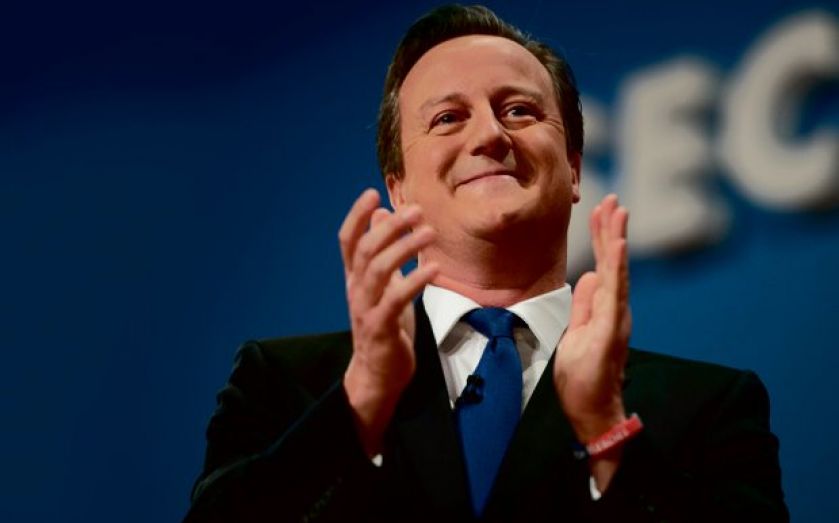Cameron was right to be bold with his radical tax cutting promise

ASK A party spin doctor what they’d like from the coverage of their leader’s speech and the honest ones will tell you that a single, tweetable, headline-friendly message is the ultimate prize. In that context, it doesn’t get much better than Cameron’s post-speech coverage, which boiled down to “tax cuts for 30m people.” Certainly, as Ed Miliband might still be feeling, it doesn’t get much worse than “he forgot the deficit.”
If the Labour leader’s speech was memorable for who he meets in parks, Cameron’s will be remembered for the sheer number of major fiscal policy announcements it contained. Indeed, old fashioned message discipline ensured that, over the course of Conservative party conference, every speech and policy was built around the theme of economic growth. Reforming welfare? Encouraging work. Apprenticeships? Plugging the skills gap. Pension tax relief? Rewarding those who do the right thing.
With his speech yesterday, the Prime Minister added radical tax cuts into the mix. And make no mistake; increasing the income tax personal allowance to £12,500 is pretty radical, not least because of how expensive it is to the Exchequer. Indeed, for the same annual cost, the chancellor could have abolished inheritance tax or capital gains tax. It is, however, a more elegant way to help the low paid than a dramatic rise in the minimum wage, which could cost jobs in sectors where the productivity gains are simply not there to support it.
Increasing the threshold at which the 40 per cent rate of income tax kicks in to £50,000 is another welcome move, but it comes with a few glaring caveats. First, the policy is an aspiration, contingent on a majority Tory government being elected. In other words, whereas Lib Dem support for raising the personal allowance can probably be taken for granted, there’s no guarantee that they’d support similar relief for the squeezed middle.
Second, the idea is to raise the threshold over the course of the next Parliament, which rules out any swift correction to the fiscal drag that has already swallowed up hundreds of thousands of earners nobody ever thought would be taxed at 40 per cent (actually 42 per cent, given employees' national insurance contributions).
Finally, while taking the threshold to £50,000 is a significant move, we would have liked to have seen a commitment that nobody will pay the 40 per cent rate until they’re earning twice the median income. This would be around £53,000 and would have to be adjusted to take into account wage growth and inflation.
The Prime Minister also reiterated his pledge to keep corporation tax at the lowest level in the G20. It’s a powerful and tangible commitment to promoting Britain as a place to do business, and it’s right that the other side of the coin is a focus on aggressive or creative tax avoidance. The IoD has long maintained that, if you believe in free markets, you have to recognise when the system breaks down or trust in it is eroded. Tackling the perception that some multinationals get a far sweeter deal than the vast majority of businesses is the right thing to do, but can only be effective when combined with a radical simplification of the UK’s sprawling tax code. Taxes must be simpler, as well as lower.
Nobody can be surprised that this was a highly political speech. Cameron used tax cuts for low and middle earners to counter the Labour charge that his is a party that looks after the rich, and when he talked about Europe, he did so only to stress his offering of an In-Out referendum and a tough line on immigration. On winning reforms to the EU’s central policy of freedom of movement, Cameron vowed not to take no for an answer. This is an emphatic position, and sits in stark contrast to the view of the new European commissioner with responsibility for employment, Marianne Thyssen, who told her confirmation hearing that “freedom of movement in the Single Market is something I am not prepared to shake”.
Many employers will be concerned to hear that Cameron wants to put tough new rules on freedom of movement at the heart of his renegotiation strategy, given that labour mobility and access to necessary skills is one of the elements of EU membership that businesses value the most. From a business perspective, regulatory reform and a focus on improving Europe’s competitiveness must take centre stage in any reform process.
For now, and as part of the permanent campaign to which all parties are signed up, the headline of “tax cuts for 30m” will satisfy the government comms operation. Beyond that, the real story will be how much of it sees the light of day and how long it will take to arrive.
